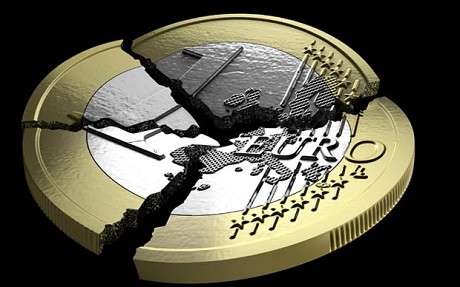
– Deutsche Bank Exercises In MADness: “Crisis Likely To Get Worse Before It Can Get Better… If Indeed It Ever Does” (ZeroHedge, Nov. 25, 2011):
Deutsche Bank’s Jim Reid, who has taken etudes in Mutual Assured Destruction to a level not even Leopold Godowsky would be able to execute (which is expected: DB is the one bank in Europe that has the biggest disconnect between reality and where the market trades its securities) reminds us once again that without the ECB stepping in it is all lost: “We are fast running out of options. The great hopes of the last few weeks for Europe have fallen one by one. We first had China pulling back, then a Levered EFSF scheme that has stalled before it has taken off, a powerless IMF and now yesterday we had even more insistence from Mrs Merkel that Eurobonds are not the answer and neither is a more aggressive ECB. It leaves us scratching our heads as to what the answer is.” Yet the ultimate step: the questionable integration of Europe’s countries in a union whereby they abdicate their sovereignty to Germany in exchange for the issuance of Eurobonds, is not only extremely unlikely, it will also come too late: “Should we get excited ahead of the treaty changes? The answer is that we are undoubtedly slowly moving closer to the start of a path towards fiscal union. However this process, even if it runs smoothly, will likely be a long, drawn-out, arduous journey. Unfortunately markets are moving at a much, much faster pace and we probably don’t have the time for a slow measured path towards fiscal union.” In other words, even if the ECB, and thus Germany were to relent, the markets can at best hope for a few days rally before risk tumbles off once again, only this time there will be no scapegoats aside from the bloated and terminally broken European bureaucratic engine which, when all is said and done, is the fatal flaw of the European experiment.
From DB’s Early Morning Reid
We are fast running out of options. The great hopes of the last few weeks for Europe have fallen one by one. We first had China pulling back, then a Levered EFSF scheme that has stalled before it has taken off, a powerless IMF and now yesterday we had even more insistence from Mrs Merkel that Eurobonds are not the answer and neither is a more aggressive ECB. It leaves us scratching our heads as to what the answer is. The press conference between Mrs Merkel, Mr Sarkozy and Mr Monti ended with us being told that information about plans to change the EU treaty will be announced in the coming days ahead of the December 9th EU summit but it won’t involve changing the ECB’s mandate. The leaders agreed to respect the independence of the ECB.
Should we get excited ahead of the treaty changes? The answer is that we are undoubtedly slowly moving closer to the start of a path towards fiscal union. However this process, even if it runs smoothly, will likely be a long, drawn-out, arduous journey. Unfortunately markets are moving at a much, much faster pace and we probably don’t have the time for a slow measured path towards fiscal union. As a result the crisis is still likely to get worse before it can get better, if indeed it ever does. The only hope is that there’s enough unity and encouragement in the leaders’ upcoming statements that persuades the ECB that notably upping their bond purchasing is a worthwhile interim measure prior to a fiscal union that they now think is likely.
Read moreDeutsche Bank Exercises In MADness: ‘Crisis Likely To Get Worse Before It Can Get Better … If Indeed It Ever Does’
